U.S. Supreme Court denies bid by Alabama lawmakers in redistricting fight
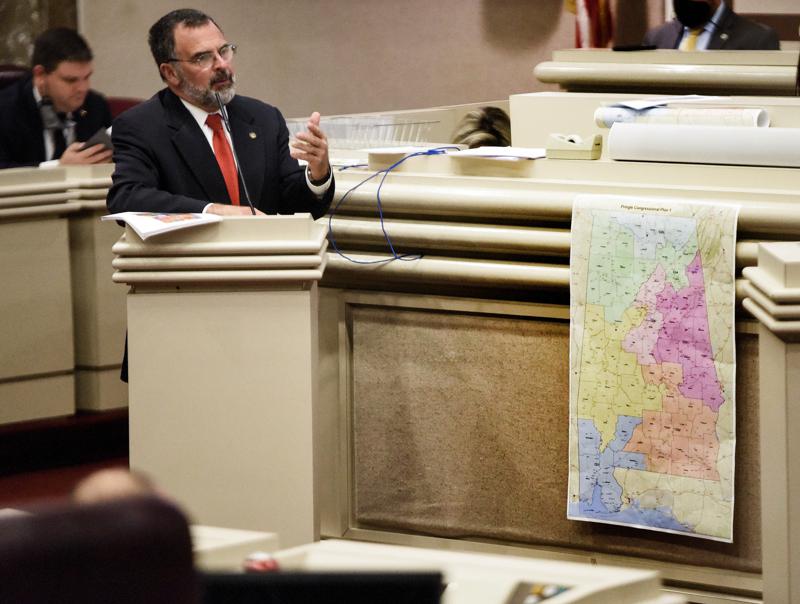
The U.S. Supreme Court won’t intervene in the fight over Alabama’s congressional maps. On Tuesday, the court denied a bid by state lawmakers for another look at the fight about the state having a second Black majority congressional district. Several groups sued to overturn the state’s 2021 congressional maps, which had one of seven districts majority Black. It was a last-ditch effort by the state to keep maps drawn during July’s special session and rejected by a three-judge federal panel earlier this month. The U.S. District Court will pick between three congressional maps drawn by a court-appointed special master and a cartographer. All three will create Black-majority districts and be a likely pickup for Democrats. “This is a victory for all Americans, particularly voters of color, who have fought tirelessly for equal representation as citizens of this nation,” former Attorney General Eric Holder said in a release. “Even with this court’s landmark decision to uphold Section 2 of the Voting Rights Act, Alabama Republicans have defied court orders at every turn by refusing to enact a map that gives Black Alabamians the opportunity to elect a candidate of their choice in two districts. “These shameful, odious efforts to diminish the rightful voting power of Black Alabamians have finally been defeated. As a result, we will see more representative maps in places that were once thought to be unreachable in the fight for fairness: Alabama, Louisiana, and Georgia. Justice has prevailed.” On June 8, the U.S. Supreme Court issued a decision in Allen v. Milligan that said Alabama’s previously-drawn map violated the Voting Rights Act and ordered new maps that create an “opportunity district” for minority voters to cast ballots for the candidates of their choice. Republished with the permission of The Center Square.
Federal judges review Alabama’s new congressional map, lack of 2nd majority-Black district
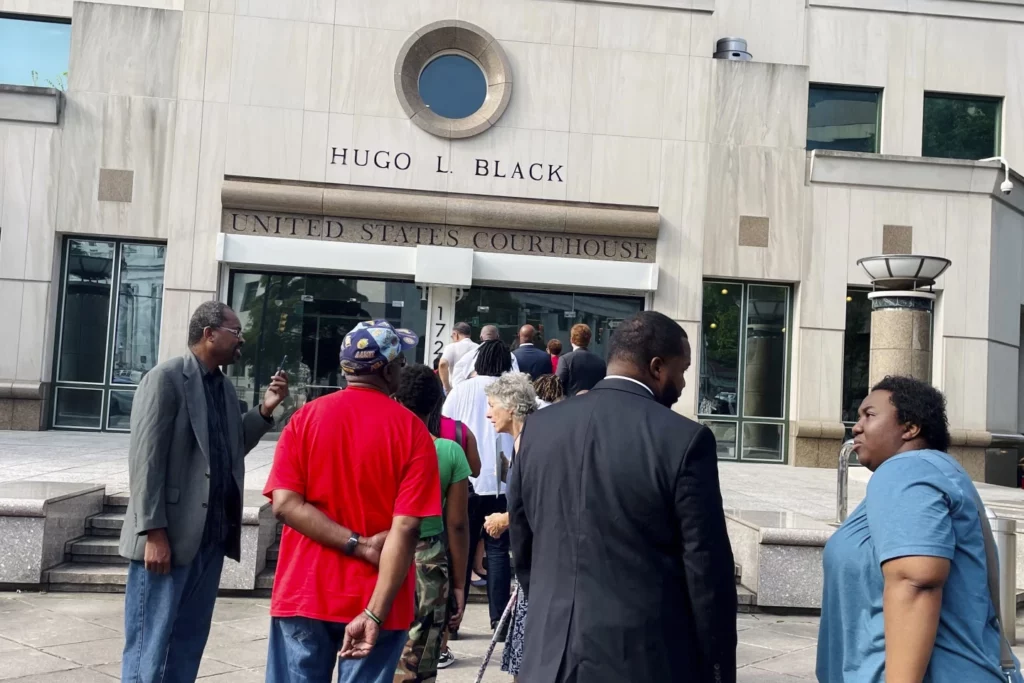
Federal judges reviewing Alabama’s new congressional map on Monday sharply questioned if state lawmakers ignored the court’s directive to create a second-majority Black district, so minority voters have a fair opportunity to influence elections. The three-judge panel held a hearing as they weigh whether to let the map stand or to step in and draw new congressional districts for the state. The panel heard arguments Monday but did not indicate when it would rule. Alabama was forced to draw new district lines after the U.S. Supreme Court, in a surprise June decision, upheld the panel’s earlier finding that the state’s then-map — which had just one Black-majority district out of seven in a state where more than one in four residents is Black — likely violated the federal Voting Rights Act. Lawyers for voters in the case argued Monday that the new plan, which maintains one majority-Black district, still discriminates against Black voters. They said it flouts the panel’s 2022 finding that Alabama should have two districts where Black voters comprise a majority or “something quite close to it.” All three judges pointedly asked the state’s lawyer whether Alabama had ignored their finding that the state should have a second district where Black voters have an opportunity to elect their preferred candidates. Judge Judge Terry F. Moorer asked if Alabama had chosen to “deliberately disregard” the court’s instruction. Judge Stan Marcus asked the state, “Were you not required to draw a new map (that provides a reasonable) opportunity (district for Black voters)?” Edmund LaCour, Alabama’s solicitor general, said the redrawn map was as “close as you get” to creating a second majority-Black district without violating the U.S. Constitution or traditional redistricting criteria. “I think it is close as you get without violating the Constitution,” LaCour said. LaCour accused the plaintiffs of seeking a “racial gerrymander” over traditional guidelines for drawing districts, such as keeping districts compact and keeping communities of interest together. Abha Khanna, an attorney representing one group of plaintiffs in the case, said Alabama chose “defiance over compliance.” “Alabama has chosen instead to thumb its nose at this court and to thumb its nose at the nation’s highest court and to thumb its nose at its own Black citizens,” Khanna said. Khanna said Alabama essentially changed nothing for Black voters by passing a map that maintained a single majority-Black district. White voters will continue to Alabama Republicans, who have been reluctant to create a Democratic-leaning district, boosted the percentage of Black voters in the majority-white 2nd Congressional District, now represented by Republican Rep. Barry Moore, from about 30% to 39.9%. State leaders are engaging in a high-stakes wager that the panel will accept their proposal or that the state will prevail in a second round of appeals to the Supreme Court which could again test the requirements of the Voting Rights Act. The panel in 2022 issued a preliminary injunction blocking the state’s then-map. During the court hearing, a judge asked the sides about next steps and whether they were starting anew in the review of the map. The high-stakes hearing drew a large number of spectators to the federal courthouse in Birmingham, where an overflow room was opened to accommodate the large crowd. Plaintiffs in the Supreme Court case attended, with many wearing T-shirts printed with their proposed map, which would have two majority-Black districts. Former U.S. Attorney General Eric Holder, chairman of the National Democratic Redistricting Committee, said in a statement that Alabama’s new map “denies Black Alabamians their lawfully protected rights.” “Alabama’s latest congressional map is a continuation of the state’s sordid history of defying court orders intended to protect the rights of Black voters,” Holder said. Republished with the permission of The Associated Press.
Plaintiffs in voting rights case urge judges to toss Alabama’s new congressional map
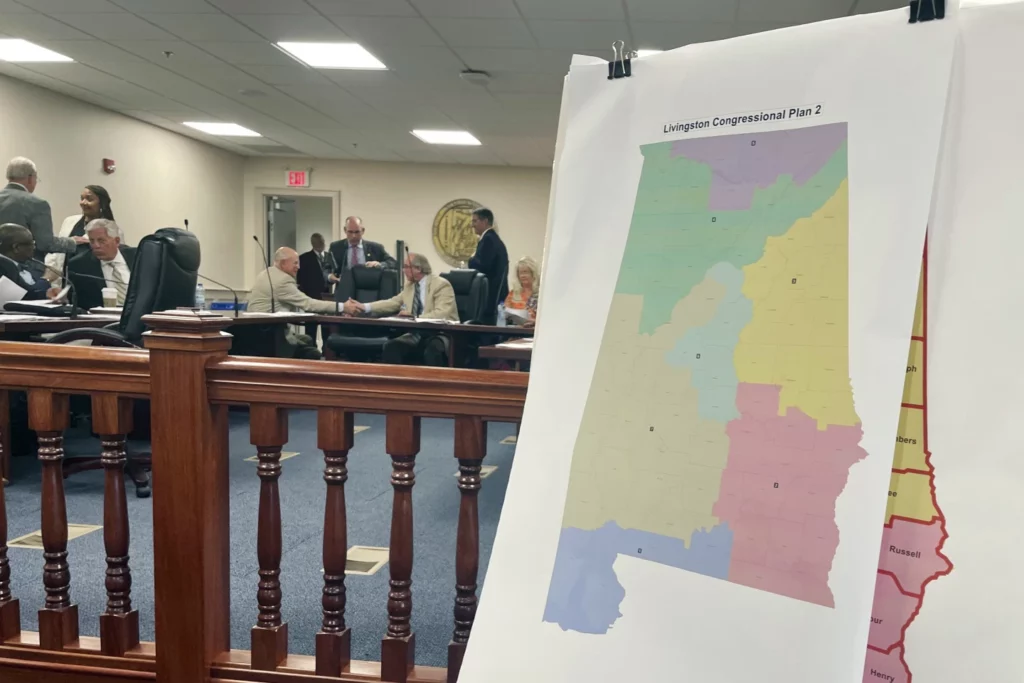
Voting rights activists are returning to court to fight Alabama’s redrawn congressional districts, saying state Republicans failed to follow federal court orders to create a district that is fair to Black voters. Plaintiffs in the high-profile redistricting case filed a written objection Friday to oppose Alabama’s new redistricting plan. They accused state Republicans of flouting a judicial mandate to create a second majority-Black district or “something quite close to it” and enacting a map that continues to discriminate against Black voters in the state. A special three-judge panel in 2022 blocked use of the the state’s existing districts and said any new congressional map should include two districts where “Black voters either comprise a voting-age majority” or something close. That panel’s decision was appealed by the state but upheld in June in a surprise ruling by the U.S. Supreme Court, which concurred that having only one Black-majority district out of seven — in a state where more than one in four residents is Black — likely violated federal law. The plaintiffs in the case, represented by the NAACP Legal Defense & Educational Fund and other groups, asked the three-judge panel to step in and draw new lines for the state. “Alabama’s new congressional map ignores this court’s preliminary injunction order and instead perpetuates the Voting Rights Act violation that was the very reason that the Legislature redrew the map,” lawyers representing the plaintiffs in the case wrote. The new map enacted by the Republican-controlled Alabama Legislature maintained a one-majority Black district but boosted the percentage of Black voters in the majority-white 2nd Congressional District, now represented by Republican Rep. Barry Moore, from about 30% to 39.9% Lawyers representing plaintiffs in the case wrote Friday that the revamped district “does not provide Black voters a realistic opportunity to elect their preferred candidates in any but the most extreme situations.” They accused state Republicans of ignoring the court’s directive to prioritize a district that would stay under GOP control, “pleasing national leaders whose objective is to maintain the Republican Party’s slim majority in the U.S. House of Representatives.” Alabama has maintained the new plan complies with the Voting Rights Act, and state leaders are wagering that the panel will accept their proposal or that the state will prevail in a second round of appeals to the Supreme Court. Republicans argued that the map meets the court’s directive and draws compact districts that comply with redistricting guidelines. The state must file its defense of the map by August 4. The three judges have scheduled an August 14 hearing in the case as the fight over the map shifts back to federal court. The outcome could have consequences across the country as the case again weighs the requirements of the Voting Rights Act in redistricting. It could also impact the partisan leanings of one Alabama congressional district in the 2024 elections with control of the U.S. House of Representatives at stake. Former U.S. Attorney General Eric Holder, chairman of the National Democratic Redistricting Committee, said in a statement that Alabama’s new map is a “brazen defiance” of the courts. “The result is a shameful display that would have made George Wallace—another Alabama governor who defied the courts—proud,” Holder said in a statement. Republished with the permission of The Associated Press.
Supreme Court weighs ‘most important case’ on democracy
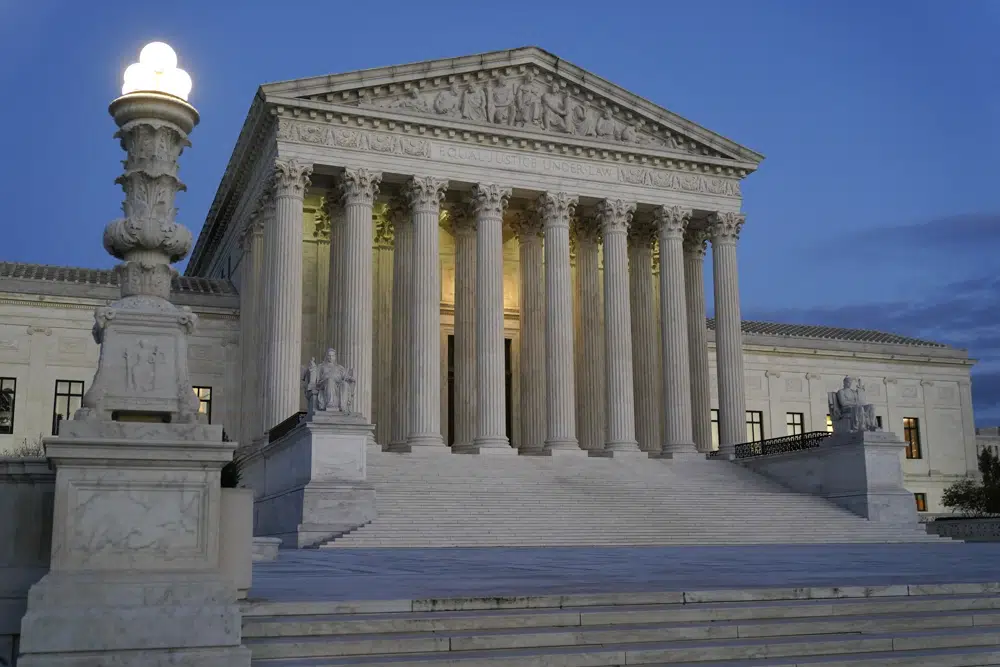
The Supreme Court is about to confront a new elections case, a Republican-led challenge asking the justices for a novel ruling that could significantly increase the power of state lawmakers over elections for Congress and the presidency. The court is set to hear arguments Wednesday in a case from North Carolina, where Republican efforts to draw congressional districts heavily in their favor were blocked by a Democratic majority on the state Supreme Court because the GOP map violated the state constitution. A court-drawn map produced seven seats for each party in last month’s midterm elections in highly competitive North Carolina. The question for the justices is whether the U.S. Constitution’s provision giving state legislatures the power to make the rules about the “times, places and manner” of congressional elections cuts state courts out of the process. “This is the single most important case on American democracy — and for American democracy — in the nation’s history,” said former federal judge Michael Luttig, a prominent conservative who has joined the legal team defending the North Carolina court decision. The Republican leaders of North Carolina’s legislature told the Supreme Court that the Constitution’s “carefully drawn lines place the regulation of federal elections in the hands of state legislatures, Congress, and no one else.” Three conservative justices already have voiced some support for the idea that the state court had improperly taken powers given by the Constitution when it comes to federal elections. A fourth has written approvingly about limiting the power of state courts in this area. But the Supreme Court has never invoked what is known as the independent state legislature theory. It was, though, mentioned in a separate opinion by three conservatives in the Bush v. Gore case that settled the 2000 presidential election. If the court were to recognize it now, opponents of the concept argue, the effects could be much broader than just redistricting. The most robust ruling for North Carolina Republicans could undermine more than 170 state constitutional provisions, over 650 state laws delegating authority to make election policies to state and local officials, and thousands of regulations down to the location of polling places, according to the Brennan Center for Justice at the New York University School of Law. Luttig, who advised former Vice President Mike Pence that he had no authority to reject electoral votes following the 2020 election, is among several prominent conservatives and Republicans who have lined up against the broad assertion that legislatures can’t be challenged in state courts when they make decisions about federal elections, including congressional redistricting. That group includes former California Gov. Arnold Schwarzenegger, law professor Steven Calabresi, a founder of the conservative Federalist Society, and Benjamin Ginsberg, a longtime lawyer for Republican candidates and the party. “Unfortunately, because of ongoing and widespread efforts to sow distrust and spread disinformation, confidence in our elections is at a low ebb,” Ginsberg wrote in a Supreme Court filing. “The version of the independent state legislature theory advanced by Petitioners, in this case, threatens to make a bad situation much worse, exacerbating the current moment of political polarization and further undermining confidence in our elections.” The arguments are taking place a day after the final contest of the 2022 midterms, the Georgia Senate runoff between Democratic Sen. Raphael Warnock and Republican Herschel Walker. In that contest, state courts ruled in favor of Democrats to allow for voting on the Saturday before the election, over the objections of Republicans. Jason Snead, of the conservative Honest Elections Project, said the case is an opportunity for the high court to rein in out-of-control state courts which are being pushed by Democratic attorneys to effectively create new rules governing voting, including the Georgia example. “We’ve seen a fairly pervasive attempt to use courts to rewrite election laws if those laws don’t suit partisan agendas,” Snead said in a call with reporters. “That’s not something we want to see when it flies in the face of the Constitution.” He is among proponents of the high court’s intervention who argue the case doesn’t represent “a threat to democracy.” The justices can instead write a narrow opinion that places limits on state courts without upsetting the choices New York and other states have made to restrict partisan redistricting, a group of New York voters wrote in a court filing. The New Yorkers implicitly recognize that if the court gives more power to state legislatures over drawing congressional lines, Republicans may not necessarily benefit. During the last redistricting cycle, states that used independent redistricting commissions rather than legislatures were largely Democratic-dominated ones. Commissions drew 95 House seats in states with Democratic legislatures and governors, as opposed to only 12 in states with GOP control. A ruling that grants legislatures ultimate power over redistricting could eradicate those commissions and let Democrats redraw a major chunk of the House map. “The bottom line is the impact of this fringe theory would be terrible,” said former Attorney General Eric Holder, chairman of the National Democratic Redistricting Committee. “It could unleash a wave of gerrymandering from both parties.” Even less dramatic changes may not necessarily tilt the GOP’s way on a national redistricting map that was essentially fought to a draw, and where state court rulings cost Democrats about as many House seats as Republicans. The Supreme Court refused to step into the North Carolina case in March, allowing the court-drawn districts to be used this year. Justices Samuel Alito, Neil Gorsuch, and Clarence Thomas dissented. Writing for the three, Alito said, “there must be some limit on the authority of state courts to countermand actions taken by state legislatures when they are prescribing rules for the conduct of federal elections. I think it is likely that the applicants would succeed in showing that the North Carolina Supreme Court exceeded those limits.” Justice Brett Kavanaugh has separately written about the need for federal courts to police the actions of state courts when it comes to federal elections. Chief Justice John Roberts’ record on this question gives both sides some hope. In 2015,
Judge expected to rule Florida congressional maps are unconstitutional
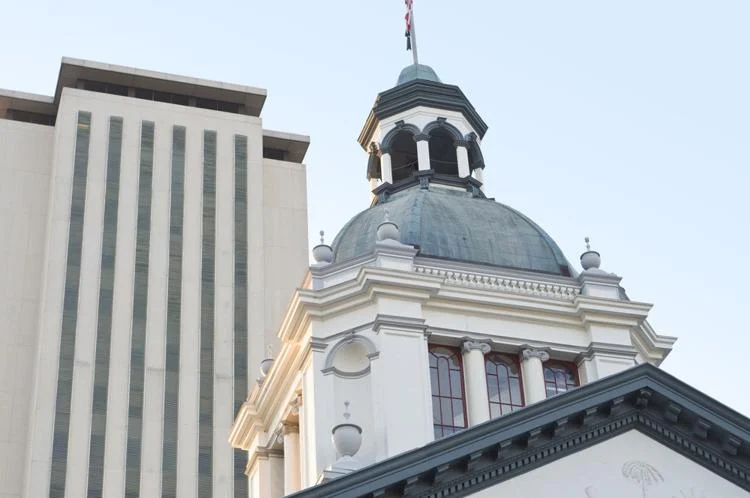
A Florida circuit judge said in a hearing Wednesday that he intended to rule against the state in a lawsuit brought over Florida’s recently approved redistricting plan. Once the judge makes the ruling, the state will appeal. The lawsuit, like the previous redistricting lawsuit last decade, is expected to be decided by the state Supreme Court. The conflict between Florida Democrats and Republican Gov. Ron DeSantis over redistricting has been brewing since January, when the governor, through his general counsel Ryan Newman, proposed a different congressional map than the one the legislature had been working on for months. The governor’s plan, Newman argued, “adheres to federal and state requirements and addresses our legal concerns, while working to increase district compactness, minimize county splits where feasible, and protect minority voting populations.” Nevertheless, the state legislature continued with its redistricting plan and passed its own congressional maps with bipartisan support. DeSantis then vetoed their plan on March 31. “We have a responsibility to produce maps for our citizens that do not contain unconstitutional racial gerrymanders,” he said when he announced the veto. The legislature’s plan, he argued, violated the U.S. Constitution. DeSantis then called a three-day special session in April directing the legislature to approve new congressional maps mirroring his plan. When the legislature met to debate and vote on the plan, the Black Democratic Caucus held a sit-in, wouldn’t allow for debate, and disrupted legislative proceedings for about an hour. Once House Speaker Chris Sprowls called the session back to order, he moved to vote on all bills, including the redistricting plan. Then, the Republican majority approved all of the bills while Democrats jeered. DeSantis then signed four bills into law on April 23. Two prompted lawsuits, including one filed by former U.S. Attorney General Eric Holder and activist groups, over the redistricting plan. They argued the new maps violated the Fair Districts amendment to the Florida Constitution and illegally favored Republicans and disenfranchised Black voters. In a virtual hearing held Wednesday before Judge J. Layne Smith of the 2nd Circuit Court of Florida, DeSantis’ plan hit another roadblock. The judge said he intends to issue an order granting the plaintiff’s request for an injunction, which would temporarily block the congressional maps from going into effect. While he couldn’t determine if the new maps violated the federal Voting Rights Act, he said, said, “I am finding the enacted map is unconstitutional under the Fair districts amendment because it diminishes African Americans’ ability to elect the representative of their choice.” He also said he wasn’t going to order the legislature “to go back in session [to fix it]. I don’t really think that’s up to me.” His order could come as soon as Thursday, although no date has yet to be determined. In response, DeSantis’ spokeswoman Taryn Fenske said in a statement, “As Judge Smith implied, these complex constitutional matters of law were always going to be decided at the appellate level. We will undoubtedly be appealing his ruling and are confident the constitutional map enacted by the Florida legislature and signed into law passes legal muster. We look forward to defending it.” County elections supervisors have said they need finalized maps by the end of the month. The primary election is August 23. The First District Court of Appeal in Tallahassee could hear the case or send it to the state Supreme Court. The matter could also be added to another special legislative session that DeSantis called for the week before Memorial Day weekend when the legislature will convene to address property insurance reform. The last redistricting lawsuit was decided by the state Supreme Court last decade after going through years of legal battles. Republished with the permission of The Center Square.
Lawsuit challenges new Alabama congressional districts
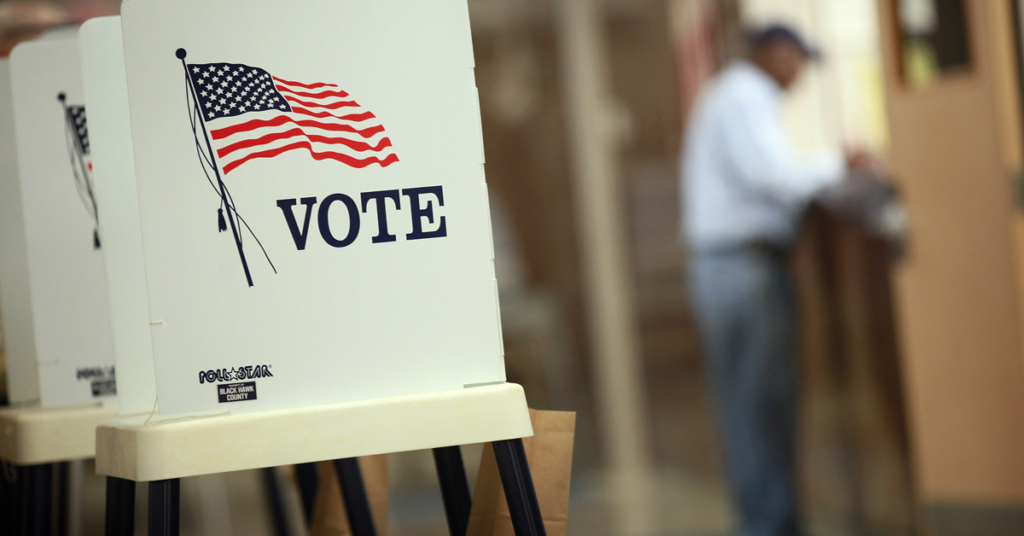
Two lawsuits are challenging Alabama’s newly approved congressional map, arguing it unlawfully dilutes the voting strength of African Americans with one majority-minority district out of seven. An organization announced a lawsuit Thursday on the same day that Alabama Gov. Kay Ivey signed the new congressional, legislative, and school board districts into law. A previously filed lawsuit by two state senators and several voters was also updated Thursday to challenge the new map. Alabama lawmakers this week approved a congressional map expected to maintain the current partisan balance: the seven-member congressional delegation with six Republicans elected from heavily white districts and one Democrat elected from the only majority-white district. Alabama has a population that is about 26% Black. A lawsuit backed by an organization aligned with a Democratic group says the plan violates the Voting Rights Act “because it strategically cracks and packs Alabama’s Black communities, diluting Black voting strength and confining Black voting power to one majority-Black district.” The lawsuit was supported by the National Redistricting Foundation, a nonprofit affiliate of the National Democratic Redistricting Committee, which is led by Eric Holder, who was attorney general under President Barack Obama. It is the second lawsuit filed over the issue. A pending lawsuit filed by two lawmakers and four voters argues the state should have two districts, where Black voters might have an opportunity “to elect candidates of their choice.” “Today, the Voting Rights Act no longer requires maintenance of a majority-black Congressional District in Alabama. To the contrary, the state cannot rely on the Voting Rights Act to justify splitting county boundaries when Districts drawn without racial gerrymandering provide Black voters constituting less than a majority, combined with reliably supportive white voters, an opportunity to elect candidates of their choice,” lawyers wrote in an amended complaint. During the recent special session, Republicans voted down Democratic efforts to create one swing congressional district with a significant centered in Birmingham that would be competitive between Republicans and Democrats. The swing district would have a population that is 40% Black. Republicans have maintained the approved maps comply with the Voting Rights Act and related court rulings. “I’m ready to defend these maps in court,” said Republican Sen. Jim McClendon, the co-chairman of the redistricting committee. McClendon argued the maps could not be drawn with two majority Black districts Republican Rep. Chris Pringle, the other co-chair of the redistricting committee, argued that having two districts — where African Americans were a significant portion of the population but under 50% — could do the opposite of what Democrats want by making them more competitive for Republicans. Republished with the permission of the Associated Press.
Democrats launch Senate battle for expanded voting rights
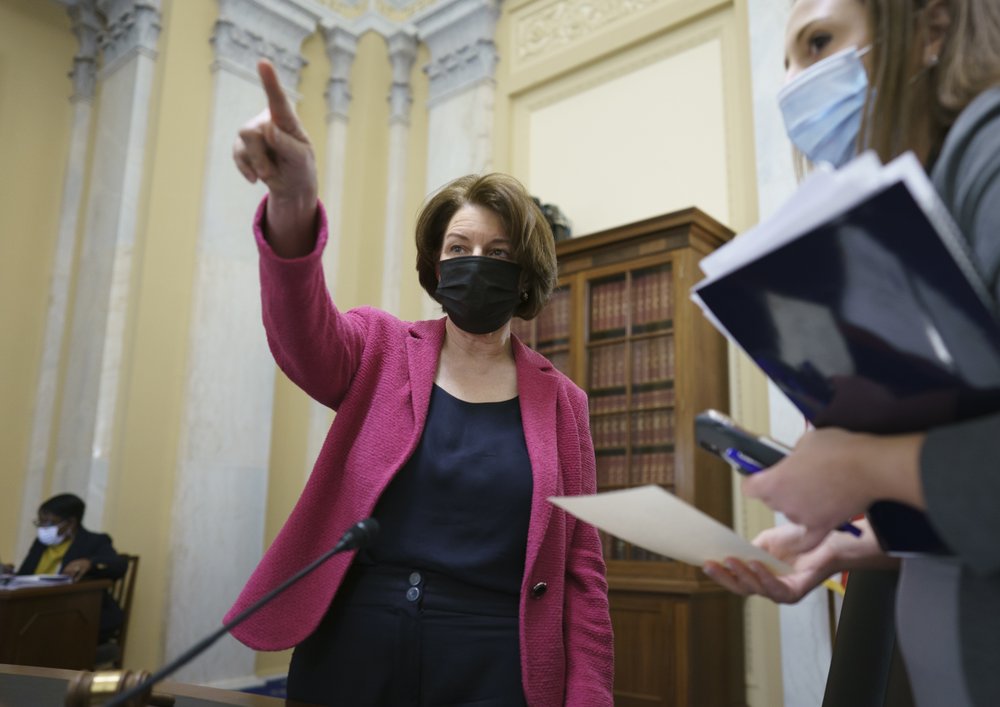
Democrats renewed their efforts Wednesday to muscle through the largest overhaul of U.S. elections in a generation, setting up a fight with Republicans that could bring partisan tensions to a climax in the evenly split Senate and become a defining issue for President Joe Biden. Democrats and Republicans both see the legislation, which touches on nearly every aspect of the electoral process, as fundamental to their parties’ political futures. The Senate bill, similar to a version passed by the House earlier this month, could shape election outcomes for years to come, striking down hurdles to voting, requiring more disclosure from political donors, restricting partisan gerrymandering of congressional districts, and bolstering election security and ethics laws. The debate over who has the right to vote, and how elections are conducted, could play out for months, if not years. Democrats newly in control of both chambers of Congress say they are trying to rebuild trust in the ballot after two tumultuous election cycles. Republicans charge the bill would strip power from the states and cement an unfair political advantage for Democrats. With the GOP unanimously opposed, the legislation is presenting a crucial test of how hard Biden and his party are willing to fight for their priorities, as well as those of their voters. Unless they united around changing Senate rules, which now require 60 votes for most bills to advance, their chance to enshrine expansive voting protections could quickly slip away. Senate Majority Leader Chuck Schumer, D-N.Y., making a rare appearance at a hearing, said Wednesday it took “mighty movements and decades of fraught political conflict” to achieve the basic dignities of current election laws and “any American who thinks that the fight for a full and fair democracy is over, is sadly and sorely mistaken.” Democrats see the measure as a forceful response to voting rights restrictions advancing in Republican-controlled statehouses across the country in the wake of Donald Trump’s repeated, baseless claims of a stolen 2020 election. Senate Rules Committee Chairwoman Amy Klobuchar, D-Minn., opened the hearing on the legislation Wednesday by invoking the Jan. 6 attack on the U.S. Capitol, in which hundreds of Trump’s supporters interrupted the electoral count after Trump pressured state election officials to change the results and told supporters to “fight like hell” to overturn his defeat. “In the end, that insurrection was about an angry mob working to undermine our democracy,” Klobuchar said. “And it reminds all of us how very fragile our democracy truly is, and how it is on all of us to not just protect that democracy but to ensure that it thrives.” Similar to the House bill that passed on a party-line vote, the Senate legislation would create automatic voter registration nationwide, allow former felons to vote, and limit the ways states can remove registered voters from their rolls. It would expand voting by mail, promote early voting and give states money to track absentee ballots. Millions of people took advantage of those practices during the pandemic last year — and after some Republican states tried to restrict them in favor of voting in person. The bill would increase oversight for election vendors and boost support for state voting system upgrades after Russia attempted to breach some of those systems in the 2016 election. It would overhaul federal oversight of campaign finance and encourage small donations to campaigns while requiring more disclosure of political donations. And it would require states to adopt independent redistricting commissions to draw congressional districts and give more teeth to federal ethics enforcement. The legislation is meant to counter the more than 250 bills have have been introduced in 43 states that would change how Americans vote, according to a tally by the Brennan Center for Justice, which backs expanded voting access. Some measures would limit mail voting, cut hours at polling places and impose restrictions that Democrats argue amount to the greatest assault on voting rights since the Jim Crow era. Testifying at the hearing, former Attorney General Eric Holder, who served under President Barack Obama, said the legislation would help fight politicians who want to maintain an “unjust status quo.” “The events of the past few months have brought into stark focus what has been true for too long: There is a large and powerful faction in this country intent on retaining power and who will bend or break the rules of our democracy in order to do so,” Holder said. Republicans say the new mandates would amount to a federal takeover of elections, which have traditionally been left to states. Senate Republican leader Mitch McConnell, R-Ky., a longtime opponent of restrictive campaign finance laws, also made a rare hearing appearance, sitting across the dais from Schumer. He said the bill is full of “silly new mandates” that would create “an invitation to chaos” for states that would have to put them in place. “This is clearly an effort by one party to rewrite the rules of our political system,” McConnell said. The bill has already run into roadblocks that have become familiar since Democrats began their narrow control of the Senate two months ago. As he has on other party priorities, Democratic Sen. Joe Manchin of West Virginia has expressed skepticism about the legislation, threatening united Democratic support. Lacking the 60 votes needed for passage, Democrats have discussed options like lowering the threshold to break a filibuster, or potentially breaking the bill into pieces. For now, Democrats have suggested they will start with bringing up potentially popular proposals like the voting rights measure and expanded gun background checks and let them fail, forcing Republicans to go on the record in opposition. In an apparent effort to pressure Manchin, the only Democrat who hasn’t signed on to the voting legislation, Republicans called West Virginia Secretary of State Mac Warner to testify in opposition to the bill. He said the legislation would force his state and others to follow “arbitrary guidelines, most of which are impossible or unattainable under the deadlines.” He urged the senators
Joe Biden to name judge Merrick Garland as attorney general

President-elect Joe Biden has selected Merrick Garland, a federal appeals court judge who in 2016 was snubbed by Republicans for a seat on the Supreme Court, as his attorney general, two people familiar with the selection process said Wednesday. In picking Garland, Biden is turning to an experienced judge who held senior positions at the Justice Department decades ago, including as a supervisor of the prosecution of the 1995 Oklahoma City bombing. The pick will force Senate Republicans to contend with the nomination of someone they spurned in 2016 — refusing even to hold hearings when a Supreme Court vacancy arose — but Biden may be banking on Garland’s credentials and reputation for moderation to ensure confirmation. Biden is expected to announce Garland’s appointment on Thursday, along with other senior leaders of the department, including former homeland security adviser Lisa Monaco as deputy attorney general and former Justice Department civil rights chief Vanita Gupta as associate attorney general. He will also name an assistant attorney general for civil rights, Kristen Clarke, the president of Lawyers’ Committee for Civil Rights Under Law, an advocacy group. Garland was selected over other finalists including Alabama Sen. Doug Jones and former Deputy Attorney General Sally Yates. The people familiar with the process spoke on condition of anonymity. One said Biden regards Garland as an attorney general who can restore integrity to the Justice Department and as someone who, having served in the Justice Department under presidents of both political parties, will be respected by nonpartisan career staff. If confirmed, Garland would confront immediate challenges, including an ongoing criminal tax investigation into Biden’s son, Hunter Biden, as well as calls from many Democrats to pursue inquiries into Donald Trump after he leaves office. A special counsel investigation into the origins of the Russia probe also remains open, forcing a new attorney general to decide how to handle it and what to make public. Garland would also inherit a Justice Department that has endured a tumultuous four years and would likely need to focus on not only civil rights issues and an overhaul of national policing policies after months of mass protests over the deaths of Black Americans at the hand of law enforcement. It was unclear how Garland’s selection would be received by Black and Latino advocates who had advocated for a Black attorney general or for someone with a background in civil rights causes and criminal justice reform. But the selection of Gupta and Clarke, two women with significant experience in civil rights, appeared designed to blunt those concerns and offered as a signal that progressive causes will be prioritized in the new administration. Garland would also return to a Justice Department radically different than the one he left. The Sept. 11 attacks were years away, the department’s national security division had not yet been created and a proliferation of aggressive cyber and counterintelligence threats from foreign adversaries have made counties like China, Russia, and North Korea top priorities for federal law enforcement. Monaco brings to the department significant national security experience, including in cybersecurity — an especially urgent issue as the U.S. government confronts a devastating hack of federal agencies that officials have linked to Russia. But some of the issues from Garland’s first stint at the department persist. Tensions between police and minorities, an issue that flared following the 1992 beating of Rodney King in Los Angeles, remain an urgent concern particularly following a summer of racial unrest that roiled American cities after the May killing of George Floyd in Minneapolis. And the FBI has confronted a surge in violence from anti-government and racially motivated extremists. That is a familiar threat to Garland, who as a senior Justice Department official in 1995 helped manage the federal government’s response to the bombing of a government building in Oklahoma City that killed 168 people. The bomber, Timothy McVeigh, was later executed. Garland has called the work the “most important thing I have done” and was known for keeping a framed photo of Oklahoma City’s Alfred P. Murrah Federal Building in his courthouse office in Washington. At the time of the bombing, Garland was 42 and principal associate deputy attorney general, a top lieutenant to Attorney General Janet Reno. He was chosen to go to Oklahoma City, the highest-ranking Justice Department official there, and led the prosecution for a month until a permanent lead prosecutor was named. Garland was selected over other contenders for the job including former Alabama senator Doug Jones, who lost his Senate seat last month, and former Deputy Attorney General Sally Yates. It is rare but not unprecedented for attorneys general to have previously served as judges. It happened in 2007 when President George W. Bush picked Michael Mukasey, a former federal judge in Manhattan, for the job. Eric Holder, President Barack Obama’s first attorney general, had also previously been a Superior Court judge. Garland was put forward by former President Barack Obama for a seat on the Supreme Court in 2016 following the death of Justice Antonin Scalia, but Republicans refused to hold hearings in the final year of Obama’s term. The vacancy was later filled by Justice Neil Gorsuch during the Trump administration. Republican Senate Majority Leader Mitch McConnell refused to let the nomination move forward in the Senate in the final months of Obama’s tenure. He was criticized by Democrats this fall when he took the opposite approach toward confirming President Donald Trump’s Supreme Court pick, Amy Coney Barrett. He said the difference this time around was that the White House and Senate were controlled by the same political parties. One year later, after the firing of FBI Director James Comey, McConnell actually floated Garland’s name as a replacement for that position, though Garland was said to be not interested. Garland has been on the federal appeals court in Washington since 1997. Before that, he had worked in private practice, as well as a federal prosecutor, a senior official in the Justice Department’s criminal division, and as
Joe Biden assembles legal team ahead of divisive 2020 election
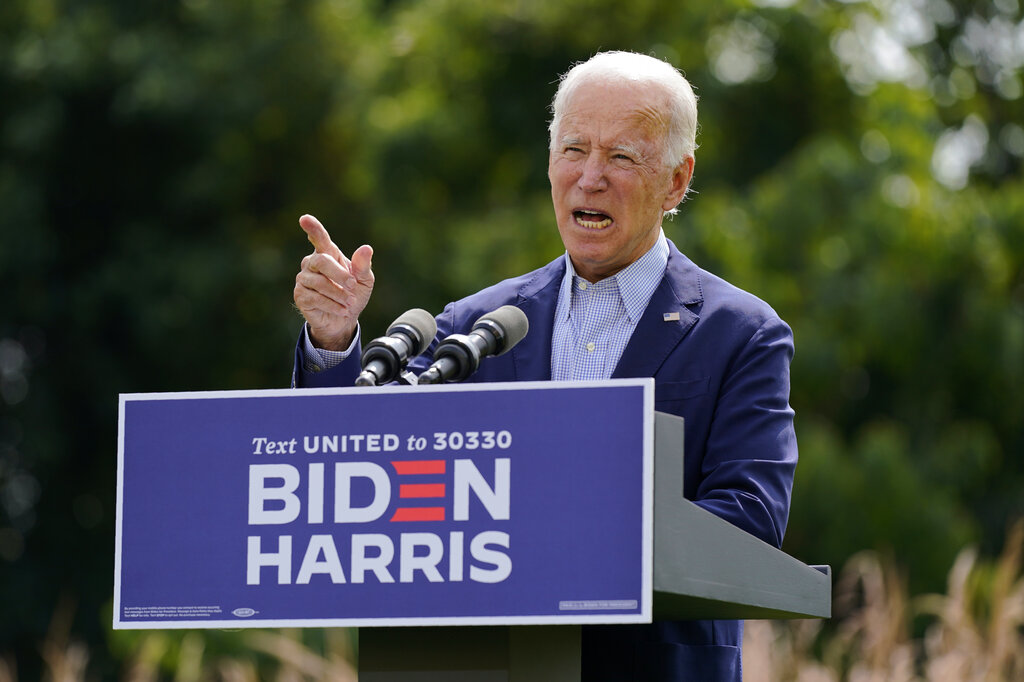
Biden’s presidential campaign says the legal war room will work to ensure that elections are properly administered and votes correctly counted.
Daniel Chism: In support of reelecting Jeff Sessions – A comprehensive rebuttal of the case against him

Daniel Chism thoroughly examines the candidacies of Jeff Sessions and Tommy Tuberville.
Donald Trump signs order on police reform, doesn’t mention racism
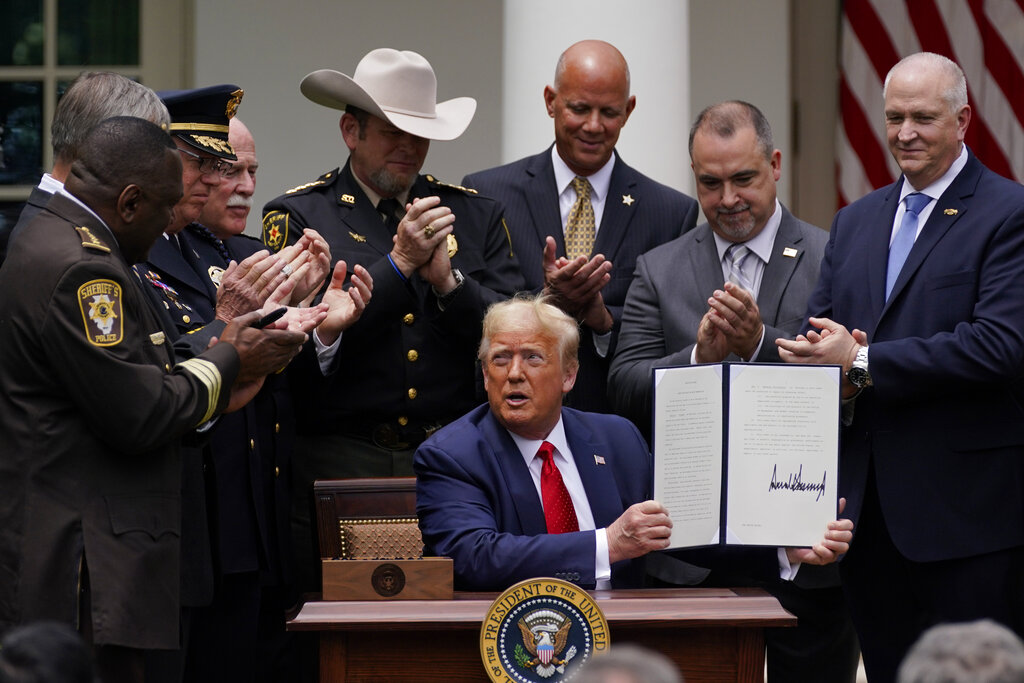
The order gives police departments a financial incentive to adopt best practices and encourage co-responder programs.
Michael Bloomberg opens door to 2020 Democratic run for president
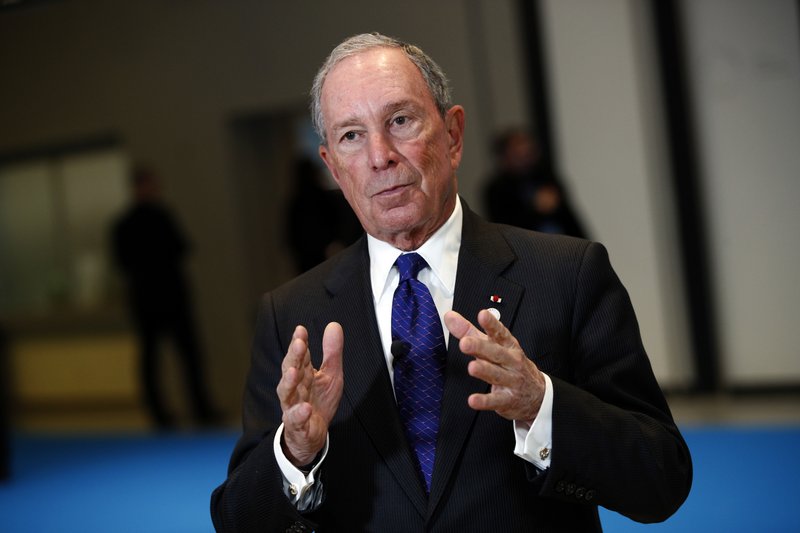
Michael Bloomberg, the billionaire former mayor of New York City, is opening the door to a 2020 Democratic presidential campaign, warning that the current field of candidates is ill equipped to defeat President Donald Trump. Full Coverage: Election 2020 Bloomberg, who initially ruled out a 2020 run, has not made a final decision on whether to jump into the race. If he were to launch a campaign, it could dramatically reshape the Democratic contest less than three months before primary voting begins. The 77-year-old has spent the past few weeks talking with prominent Democrats about the state of the 2020 field, expressing concerns about the steadiness of former Vice President Joe Biden’s campaign and the rise of liberal Massachusetts Sen. Elizabeth Warren, according to people with knowledge of those discussions. In recent days, he took steps to keep his options open, including moving to get on the primary ballot in Alabama ahead of the state’s Friday filing deadline. In a statement on Thursday, Bloomberg adviser Howard Wolfson said the former mayor believes Trump “represents an unprecedented threat to our nation” and must be defeated. “But Mike is increasingly concerned that the current field of candidates is not well positioned to do that,” Wolfson said. Bloomberg’s moves come as the Democratic race enters a crucial phase. Biden’s front-runner status has been vigorously challenged by Warren and Vermont Sen. Bernie Sanders, who are flush with cash from small-dollar donors. But both are viewed by some Democrats as too liberal to win in a general election faceoff with Trump. Despite a historically large field, some Democrats anxious about defeating Trump have been looking for other options. Former Attorney General Eric Holder and former Massachusetts Gov. Deval Patrick have quietly had conversations with supporters urging them to consider a run, but neither appears likely to get in the race. Bloomberg, a Republican-turned-independent who registered as a Democrat last year, has flirted with a presidential run before but ultimately backed down, including in 2016. He endorsed Hillary Clinton in that race and, in a speech at the Democratic Party convention, pummeled Trump as a con who has oversold his business successes. Bloomberg plunged his efforts — and his money — into gun control advocacy and climate change initiatives. He again looked seriously at a presidential bid earlier this year, traveling to early voting states and conducting extensive polling, but decided not to run in part because of Biden’s perceived strength. Biden did not address Bloomberg’s potential candidacy at a fundraiser Thursday night in Boston. With immense personal wealth, Bloomberg could quickly build out a robust campaign operation across the country. Still, his advisers acknowledge that his late entry to the race could make competing in states like Iowa and New Hampshire, which have been blanketed by candidates for nearly a year, difficult. Instead, they previewed a strategy that would focus more heavily on the March 3 “Super Tuesday” contests, including in delegate-rich California. Some Democrats were skeptical there would be a groundswell of interest in the former New York mayor. “There are smart and influential people in the Democratic Party who think a candidate like Bloomberg is needed,” said Jennifer Palmieri, who advised Clinton’s 2016 campaign. “But there is zero evidence that rank-and-file voters in the early states of Iowa and New Hampshire feel the same.” Still, others credited Bloomberg with taking on “some of America’s biggest challenges” and finding success. “While this is not an endorsement, Michael Bloomberg is a friend and I admire his track record as a successful business leader and Mayor who finds practical solutions to some of America’s biggest challenges, from creating good jobs to addressing the opioid crisis and fighting for common-sense gun safety,” said Rhode Island Gov. Gina Raimondo, a Democrat. Bloomberg reached out to several prominent Democrats on Thursday, including Raimondo. One Democrat Bloomberg hasn’t spoken to as he’s reconsidered his run is former President Barack Obama. Bloomberg would pose an immediate ideological challenge to Biden, who is running as a moderate and hopes to appeal to independents and Republicans who have soured on Trump. But the billionaire media mogul with deep Wall Street ties could also energize supporters of Warren and Sanders, who have railed against income inequality and have vowed to ratchet up taxes on the wealthiest Americans. “He’s a literal billionaire entering the race to keep the progressives from winning,” said Rebecca Katz, a New York-based liberal Democratic strategist. “He is the foil.” Warren on Thursday tweeted: “Welcome to the race, @MikeBloomberg!” and linked to her campaign website, saying he would find there “policy plans that will make a huge difference for working people and which are very popular.” Bloomberg would face other challenges as well, particularly scrutiny of his three terms as mayor. He has defended the New York Police Department’s use of the controversial stop-and-frisk policy that has been criticized as targeting African Americans and Hispanics. Black voters in particular are one of the most powerful constituencies in Democratic politics. Bloomberg will have to move quickly in the coming days and weeks to get on the ballot in many of the primary states, including Alabama. New Hampshire’s filing deadline is Nov. 15. In Arkansas, another Super Tuesday state, a Democratic Party spokesman said a person representing a “mystery candidate” reached out Thursday afternoon asking about the requirements to join the ballot. Reed Brewer, communications director for the Arkansas Democrats, said he walked the individual through the process — which simply requires filing documentation with both the state party and secretary of state, as well as paying a $2,500 fee — and was assured that the fee would be “no problem” for the mystery candidate. There is no filing requirement for a candidate to run in the Iowa caucuses, which are a series of Democratic Party meetings, not state-run elections. It means a candidate can enter the race for the Feb. 3 leadoff contest at any time. Associated Press writers Jill Colvin in Washington; Alexandra Jaffe and Thomas Beaumont in Des Moines,


